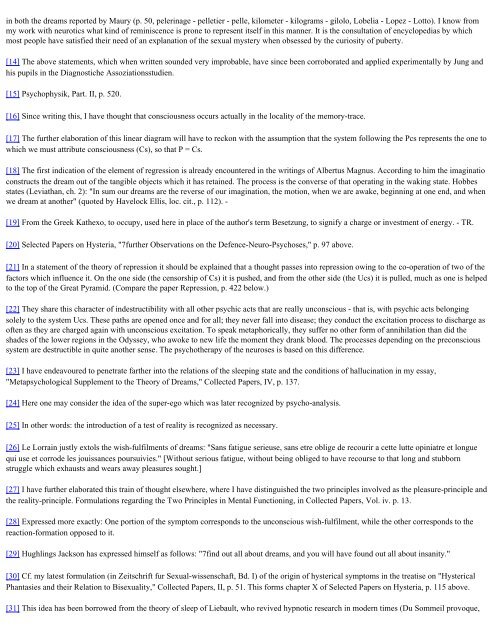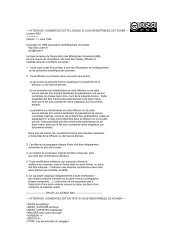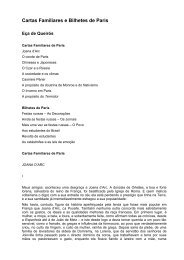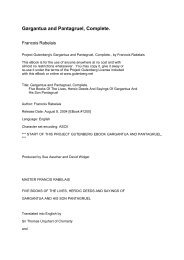The Interpretation of Dreams Sigmund Freud (1900)
The Interpretation of Dreams Sigmund Freud (1900)
The Interpretation of Dreams Sigmund Freud (1900)
Create successful ePaper yourself
Turn your PDF publications into a flip-book with our unique Google optimized e-Paper software.
in both the dreams reported by Maury (p. 50, pelerinage - pelletier - pelle, kilometer - kilograms - gilolo, Lobelia - Lopez - Lotto). I know from<br />
my work with neurotics what kind <strong>of</strong> reminiscence is prone to represent itself in this manner. It is the consultation <strong>of</strong> encyclopedias by which<br />
most people have satisfied their need <strong>of</strong> an explanation <strong>of</strong> the sexual mystery when obsessed by the curiosity <strong>of</strong> puberty.<br />
[14] <strong>The</strong> above statements, which when written sounded very improbable, have since been corroborated and applied experimentally by Jung and<br />
his pupils in the Diagnostiche Assoziationsstudien.<br />
[15] Psychophysik, Part. II, p. 520.<br />
[16] Since writing this, I have thought that consciousness occurs actually in the locality <strong>of</strong> the memory-trace.<br />
[17] <strong>The</strong> further elaboration <strong>of</strong> this linear diagram will have to reckon with the assumption that the system following the Pcs represents the one to<br />
which we must attribute consciousness (Cs), so that P = Cs.<br />
[18] <strong>The</strong> first indication <strong>of</strong> the element <strong>of</strong> regression is already encountered in the writings <strong>of</strong> Albertus Magnus. According to him the imaginatio<br />
constructs the dream out <strong>of</strong> the tangible objects which it has retained. <strong>The</strong> process is the converse <strong>of</strong> that operating in the waking state. Hobbes<br />
states (Leviathan, ch. 2): "In sum our dreams are the reverse <strong>of</strong> our imagination, the motion, when we are awake, beginning at one end, and when<br />
we dream at another" (quoted by Havelock Ellis, loc. cit., p. 112). -<br />
[19] From the Greek Kathexo, to occupy, used here in place <strong>of</strong> the author's term Besetzung, to signify a charge or investment <strong>of</strong> energy. - TR.<br />
[20] Selected Papers on Hysteria, "7further Observations on the Defence-Neuro-Psychoses," p. 97 above.<br />
[21] In a statement <strong>of</strong> the theory <strong>of</strong> repression it should be explained that a thought passes into repression owing to the co-operation <strong>of</strong> two <strong>of</strong> the<br />
factors which influence it. On the one side (the censorship <strong>of</strong> Cs) it is pushed, and from the other side (the Ucs) it is pulled, much as one is helped<br />
to the top <strong>of</strong> the Great Pyramid. (Compare the paper Repression, p. 422 below.)<br />
[22] <strong>The</strong>y share this character <strong>of</strong> indestructibility with all other psychic acts that are really unconscious - that is, with psychic acts belonging<br />
solely to the system Ucs. <strong>The</strong>se paths are opened once and for all; they never fall into disease; they conduct the excitation process to discharge as<br />
<strong>of</strong>ten as they are charged again with unconscious excitation. To speak metaphorically, they suffer no other form <strong>of</strong> annihilation than did the<br />
shades <strong>of</strong> the lower regions in the Odyssey, who awoke to new life the moment they drank blood. <strong>The</strong> processes depending on the preconscious<br />
system are destructible in quite another sense. <strong>The</strong> psychotherapy <strong>of</strong> the neuroses is based on this difference.<br />
[23] I have endeavoured to penetrate farther into the relations <strong>of</strong> the sleeping state and the conditions <strong>of</strong> hallucination in my essay,<br />
"Metapsychological Supplement to the <strong>The</strong>ory <strong>of</strong> <strong>Dreams</strong>," Collected Papers, IV, p. 137.<br />
[24] Here one may consider the idea <strong>of</strong> the super-ego which was later recognized by psycho-analysis.<br />
[25] In other words: the introduction <strong>of</strong> a test <strong>of</strong> reality is recognized as necessary.<br />
[26] Le Lorrain justly extols the wish-fulfilments <strong>of</strong> dreams: "Sans fatigue serieuse, sans etre oblige de recourir a cette lutte opiniatre et longue<br />
qui use et corrode les jouissances poursuivies." [Without serious fatigue, without being obliged to have recourse to that long and stubborn<br />
struggle which exhausts and wears away pleasures sought.]<br />
[27] I have further elaborated this train <strong>of</strong> thought elsewhere, where I have distinguished the two principles involved as the pleasure-principle and<br />
the reality-principle. Formulations regarding the Two Principles in Mental Functioning, in Collected Papers, Vol. iv. p. 13.<br />
[28] Expressed more exactly: One portion <strong>of</strong> the symptom corresponds to the unconscious wish-fulfilment, while the other corresponds to the<br />
reaction-formation opposed to it.<br />
[29] Hughlings Jackson has expressed himself as follows: "7find out all about dreams, and you will have found out all about insanity."<br />
[30] Cf. my latest formulation (in Zeitschrift fur Sexual-wissenschaft, Bd. I) <strong>of</strong> the origin <strong>of</strong> hysterical symptoms in the treatise on "Hysterical<br />
Phantasies and their Relation to Bisexuality," Collected Papers, II, p. 51. This forms chapter X <strong>of</strong> Selected Papers on Hysteria, p. 115 above.<br />
[31] This idea has been borrowed from the theory <strong>of</strong> sleep <strong>of</strong> Liebault, who revived hypnotic research in modern times (Du Sommeil provoque,









